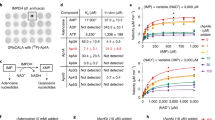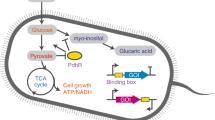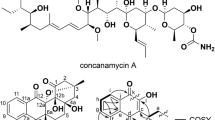Abstract
The gene encoding inosine 5′–monophosphate dehydrogenase (IMP dehydrogenase) of Bacillus subtilis was cloned in pBR322 in Escherichia coli and subsequently subcloned into the B. subtilis plasmid, pC194. The introduction of the recombinant plasmid encoding IMP dehydrogenase to B. subtilis NA6128, an inosine overproducer, elevated its level of IMP dehydrogenase activity and remarkably increased the productivity of guanosine, accompanied by a decreased accumulation of inosine.
This is a preview of subscription content, access via your institution
Access options
Subscribe to this journal
Receive 12 print issues and online access
$209.00 per year
only $17.42 per issue
Buy this article
- Purchase on Springer Link
- Instant access to full article PDF
Prices may be subject to local taxes which are calculated during checkout
Similar content being viewed by others
References
Nakao, Y. 1979. Microbial production of nucleosides and nucleotides, p. 311–354. In: Microbial Technology Vol. 1. Peppier, H.J., and Perlman, D., (eds.). Academic Press, New York.
Shibai, H., Enei, H., and Hirose, Y. 1978. Purine nucleosides fermentations. Process Biochem. 13:6–8.
Nogami, I., Kida, M., Iijima, T., and Yoneda, M. 1968. Studies on the fermentative production of purine derivatives; Derivation of guanosine and inosine-producing mutants from a Bacillus strain. Agric. Biol. Chem. 32:144–152.
Matsui, H., Sato, K., Enei, H. and Hirose, Y. 1979. Production of guanosine by pscicofuranine and decoyinine resistant mutants of Bacillus subtilis. Agric. Biol. Chem. 43:1739–1744.
Miyagawa, K., Akiyama, S. and Doi, M. 1984. Method of producing inosine and/or guanosine. Japanese patent application, Tokukaisho 59-42895.
Maniatis, T., Fritsch, E.F., and Sambrook, J. 1982. Molecular Cloning. A Laboratory Manual. Cold Spring Harbor Laboratory, Cold Spring Harbor, New York.
Saito, H. and Miura, K. 1963. Preparation of transforming deoxyribo-nucleic acid by phenol treatment. Biochem. Biophy. Acta. 72:619–629.
Birnboim, H.C. and Doly, J. 1979. A rapid alkaline extraction procedure for screening recombinant plasmid DNA. Nucleic Acids Res. 7:1513–1523.
Cohen, S.N., Chang, A.C.Y., and Hsu, L. 1972. Nonchromosomal antibiotic resistance in bacteria; Genetic transformation of Escherichia coli by R factor DNA. Pro. Natl. Acad. Sci. (U.S.A.) 69:2110–2114.
Chang, S. and Cohen, S.N. 1979. High frequency transformation of Bacillus subtilis protoplasts by plasmid DNA. Mol. Gen. Genet. 168:111–115.
Magasanik, B. 1963. IMP dehydrogenase from Aerobacter aerogenes, p. 106–111. In: Methods in Enzymology Vol. VI. Colowick, S. P. and Kaplan, N. O. (Eds.). Academic Press, New York.
Lowry, O.H., Rosebrough, N.J., Farr, A.L., and Randall, R.J. 1951. Protein measurement with the Folin phenol reagent. J. Biol. Chem. 193:265–275.
Author information
Authors and Affiliations
Rights and permissions
About this article
Cite this article
Miyagawa, Ki., Kimura, H., Nakahama, K. et al. Cloning of the Bacillus Subtilis IMP Dehydrogenase Gene and its Application to Increased Production of Guanosine. Nat Biotechnol 4, 225–228 (1986). https://doi.org/10.1038/nbt0386-225
Received:
Accepted:
Issue Date:
DOI: https://doi.org/10.1038/nbt0386-225



